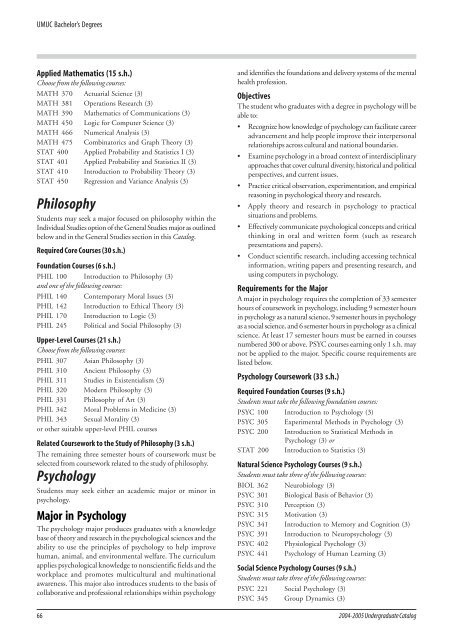Statements of Policy - UMUC Europe
Statements of Policy - UMUC Europe
Statements of Policy - UMUC Europe
Create successful ePaper yourself
Turn your PDF publications into a flip-book with our unique Google optimized e-Paper software.
<strong>UMUC</strong> Bachelor’s Degrees<br />
Applied Mathematics (15 s.h.)<br />
Choose from the following courses:<br />
MATH 370 Actuarial Science (3)<br />
MATH 381 Operations Research (3)<br />
MATH 390 Mathematics <strong>of</strong> Communications (3)<br />
MATH 450 Logic for Computer Science (3)<br />
MATH 466 Numerical Analysis (3)<br />
MATH 475 Combinatorics and Graph Theory (3)<br />
STAT 400 Applied Probability and Statistics I (3)<br />
STAT 401 Applied Probability and Statistics II (3)<br />
STAT 410 Introduction to Probability Theory (3)<br />
STAT 450 Regression and Variance Analysis (3)<br />
Philosophy<br />
Students may seek a major focused on philosophy within the<br />
Individual Studies option <strong>of</strong> the General Studies major as outlined<br />
below and in the General Studies section in this Catalog.<br />
Required Core Courses (30 s.h.)<br />
Foundation Courses (6 s.h.)<br />
PHIL 100 Introduction to Philosophy (3)<br />
and one <strong>of</strong> the following courses:<br />
PHIL 140 Contemporary Moral Issues (3)<br />
PHIL 142 Introduction to Ethical Theory (3)<br />
PHIL 170 Introduction to Logic (3)<br />
PHIL 245 Political and Social Philosophy (3)<br />
Upper-Level Courses (21 s.h.)<br />
Choose from the following courses:<br />
PHIL 307 Asian Philosophy (3)<br />
PHIL 310 Ancient Philosophy (3)<br />
PHIL 311 Studies in Existentialism (3)<br />
PHIL 320 Modern Philosophy (3)<br />
PHIL 331 Philosophy <strong>of</strong> Art (3)<br />
PHIL 342 Moral Problems in Medicine (3)<br />
PHIL 343 Sexual Morality (3)<br />
or other suitable upper-level PHIL courses<br />
Related Coursework to the Study <strong>of</strong> Philosophy (3 s.h.)<br />
The remaining three semester hours <strong>of</strong> coursework must be<br />
selected from coursework related to the study <strong>of</strong> philosophy.<br />
Psychology<br />
Students may seek either an academic major or minor in<br />
psychology.<br />
Major in Psychology<br />
The psychology major produces graduates with a knowledge<br />
base <strong>of</strong> theory and research in the psychological sciences and the<br />
ability to use the principles <strong>of</strong> psychology to help improve<br />
human, animal, and environmental welfare. The curriculum<br />
applies psychological knowledge to nonscientific fields and the<br />
workplace and promotes multicultural and multinational<br />
awareness. This major also introduces students to the basis <strong>of</strong><br />
collaborative and pr<strong>of</strong>essional relationships within psychology<br />
66<br />
and identifies the foundations and delivery systems <strong>of</strong> the mental<br />
health pr<strong>of</strong>ession.<br />
Objectives<br />
The student who graduates with a degree in psychology will be<br />
able to:<br />
• Recognize how knowledge <strong>of</strong> psychology can facilitate career<br />
advancement and help people improve their interpersonal<br />
relationships across cultural and national boundaries.<br />
• Examine psychology in a broad context <strong>of</strong> interdisciplinary<br />
approaches that cover cultural diversity, historical and political<br />
perspectives, and current issues.<br />
• Practice critical observation, experimentation, and empirical<br />
reasoning in psychological theory and research.<br />
• Apply theory and research in psychology to practical<br />
situations and problems.<br />
• Effectively communicate psychological concepts and critical<br />
thinking in oral and written form (such as research<br />
presentations and papers).<br />
• Conduct scientific research, including accessing technical<br />
information, writing papers and presenting research, and<br />
using computers in psychology.<br />
Requirements for the Major<br />
A major in psychology requires the completion <strong>of</strong> 33 semester<br />
hours <strong>of</strong> coursework in psychology, including 9 semester hours<br />
in psychology as a natural science, 9 semester hours in psychology<br />
as a social science, and 6 semester hours in psychology as a clinical<br />
science. At least 17 semester hours must be earned in courses<br />
numbered 300 or above. PSYC courses earning only 1 s.h. may<br />
not be applied to the major. Specific course requirements are<br />
listed below.<br />
Psychology Coursework (33 s.h.)<br />
Required Foundation Courses (9 s.h.)<br />
Students must take the following foundation courses:<br />
PSYC 100 Introduction to Psychology (3)<br />
PSYC 305 Experimental Methods in Psychology (3)<br />
PSYC 200 Introduction to Statistical Methods in<br />
Psychology (3) or<br />
STAT 200 Introduction to Statistics (3)<br />
Natural Science Psychology Courses (9 s.h.)<br />
Students must take three <strong>of</strong> the following courses:<br />
BIOL 362 Neurobiology (3)<br />
PSYC 301 Biological Basis <strong>of</strong> Behavior (3)<br />
PSYC 310 Perception (3)<br />
PSYC 315 Motivation (3)<br />
PSYC 341 Introduction to Memory and Cognition (3)<br />
PSYC 391 Introduction to Neuropsychology (3)<br />
PSYC 402 Physiological Psychology (3)<br />
PSYC 441 Psychology <strong>of</strong> Human Learning (3)<br />
Social Science Psychology Courses (9 s.h.)<br />
Students must take three <strong>of</strong> the following courses:<br />
PSYC 221 Social Psychology (3)<br />
PSYC 345 Group Dynamics (3)<br />
2004-2005 Undergraduate Catalog






